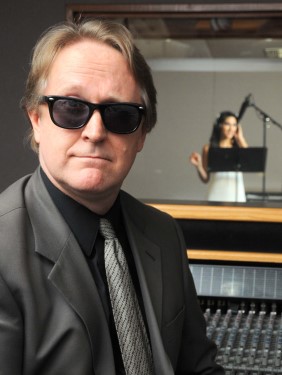|
VoiceOverXtra Interview: Bill Holmes / Part 2
Directions: The Best Ones Help
Create Pictures In Your Mind
By John Florian
VoiceOverXtra
 Bill Holmes, the multi-tasking voice talent / teacher / director / producer and owner of Compost Productions in North Hollywood, CA has conducted countless voice-over auditions as a freelance casting director. Bill Holmes, the multi-tasking voice talent / teacher / director / producer and owner of Compost Productions in North Hollywood, CA has conducted countless voice-over auditions as a freelance casting director. In Part 1 of a recent interview, he explained how to make “strong” – rather than “wrong” – choices when studying audition copy for ways to voice it.
Another key to winning auditions, whether in-person or online, is the ability to follow directions – including how to interpret confusing and downright poor directions from the other side of the glass!
And that’s the focus of Part 2, below …
Bill, in an in-person audition, what are we likely to expect from the session’s director?
Well, everyone directs differently. Some will be just horrible. They’ll want to hear you read a certain way, but won’t know how to tell you how to get there.
Others will over-direct you and tell you how to say every little tiny word.
Then you’ll find what I consider to be the better directors, who collaborate with you, and who try to get you to see the pictures in your mind that will get the sound they want from you.
What might that good director say?
As an example, one director might say, “You know, we need to bring this in at 30 seconds, so do it a lot faster.”
But the better director will instead suggest that you “Give the read some urgency.”
That will get it done faster, but also, an actor can take it and go, “Oh, it’s more urgent. I know how to change my mental picture,” rather than think “I’m just going to say these words really fast.”
Because with the plain old fast read, all the believability disappears. You still need it to be conversational. Do you know what I mean?
Right.
That’s the art of voice-over. That is when it becomes the complicated skill that the higher-up echelon voice actors – the people who are making $100,000 a year – are really good at. They can take a bad direction but think, “I know what they mean by that. I know how to make the adjustment in my head.”
Whereas people starting out take some of those directions literally, and they just do it faster and then all of the pictures go out of your head. You’re stuck just reading it.
Bill, can you give another example of poor direction?
Let’s see. Okay.
A director might say to you, “Can you be softer? We need it quieter.”
Well, the better direction in my opinion might be:
“Bring the person you are talking to closer to you. Put that person right next to you.”
See what I mean? It’s a simple acting choice.
If a director would say that, it’s more of a collaborative effort with the actor, as opposed to, “I am going to tell you how to do it because I have been directing casting sessions for years and years and years.”
That’s good advice for directors.
One of the reasons I think people hire me to direct casting sessions is that I let the actors audition. I let the actors interpret the copy, and all I do is keep them within the perimeters of what the client needs.
If instead, I give people line readings, everybody is going to sound the same, and that’s not what the client wants, in my opinion.
Any final thoughts about the audition process?
The most important thing is what I just said. Audition for the audition. In three to four minutes, go in and do what you do.
And know that you are probably going to go to 100 auditions before you get any kind of a bite. I mean, that’s the ratio these days.
It’s very difficult to book work, and if you are booking work, you are either in a really great advertising category, or you are a really good actor, or you just happen to have something they want, or you went in and nailed the audition.
There are so many different circumstances that you could chalk it up to.
But enjoy auditioning, because what a lot of people in the voice-over and acting world don’t understand is that it’s not your job to do the actual voice work. It is your job to go look for work.
That is how you will make a living doing voice-overs.. If you don’t enjoy that process, then maybe this business is not for you.
Well, you sound like you enjoy all that you do.
Oh yeah, I’m having a great time. Especially with voice-overs, I do it because it’s fun!
Thanks, Bill.
Bill Holmes' Compost Productions is a full-service audio and video post-production facility located in North Hollywood, which also offers group and private voice-over instruction. Classes include Introduction to Voice-Overs; Audition Workout; Scene Study; Margaritas, Mojitos & Microphones (copy reading); and "Billy Bob" Weekend Seminars with animation great Bob Bergen. He is also a workshop instructor on the VoiceLympics VoiceOver Cruise, Sept. 21-26, 2009, from Vancouver to Los Angeles.
Email: compostproductions@yahoo.com
Stump The Band movie trailer: www.stumptheband.com
|
|
|
Tell Us What YOU Think!
Please Note: Since we check for spam, there will be a slight delay in the actual posting of your comment.
Comments
No comments have been posted yet. Hurry, and you could be the first!




.gif)




click for new article alerts